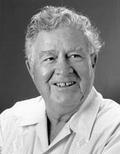Sterling M. McMurrin
Sterling M. McMurrin was a noted philosopher and scholar. He served as United States Commissioner of Education under President John F. Kennedy. He was an advocate for school integration and spoke out against excessive involvement of the federal government in education. He resigned from the position 18 months later to return to teaching philosophy at the University of Utah.[1]
McMurrin was born on January 12, 1914, in Woods Cross, Utah. His family moved to Los Angeles, California, where he attended high school and the University of California at Los Angeles. His AB degree in history and his MA degree in philosophy were obtained from the University of Utah. He later worked to establish the University of Utah as a major institution of higher education. In 1954, he was named Dean of the College of Letters and Science and in 1960 was named academic vice president at the U. After his return from Washington, DC, McMurrin was appointed the E. E. Erickson Distinguished Professor of Philosophy in 1964 and became the first Provost in the history of the school. From 1966 to 1978, he served as Dean of the Graduate School but retired soon after to return to teaching.
He earned his PhD in philosophy from the University of Southern California. He did postdoctoral studies at Columbia University and Union Theological Seminary (where he was a visiting scholar), and Princeton University (where he was a Ford Fellow in philosophy).
He worked for a time in the Church Educational System of The Church of Jesus Christ of Latter-day Saints as a seminary teacher and as institute of Religion director at the University of Arizona. He also taught at Arizona State University.
McMurrin was appointed to numerous education boards, including the Carnegie Foundation for Advancement of Teaching, and he was president of the Utah Conference on Higher Education.
He was the author of Education and Freedom and Religion, Reason and Truth as well as many other books, articles, and chapters.
According to Wikipedia, McMurrin was at odds with some of the leadership of the Church of Jesus Christ because he did not believe in the historicity of the Book of Mormon and spoke about the decline of intellectual freedom in the Church. He was, however, a devoted member.[2]
He died on April 6, 1996, in St. George, Utah.
